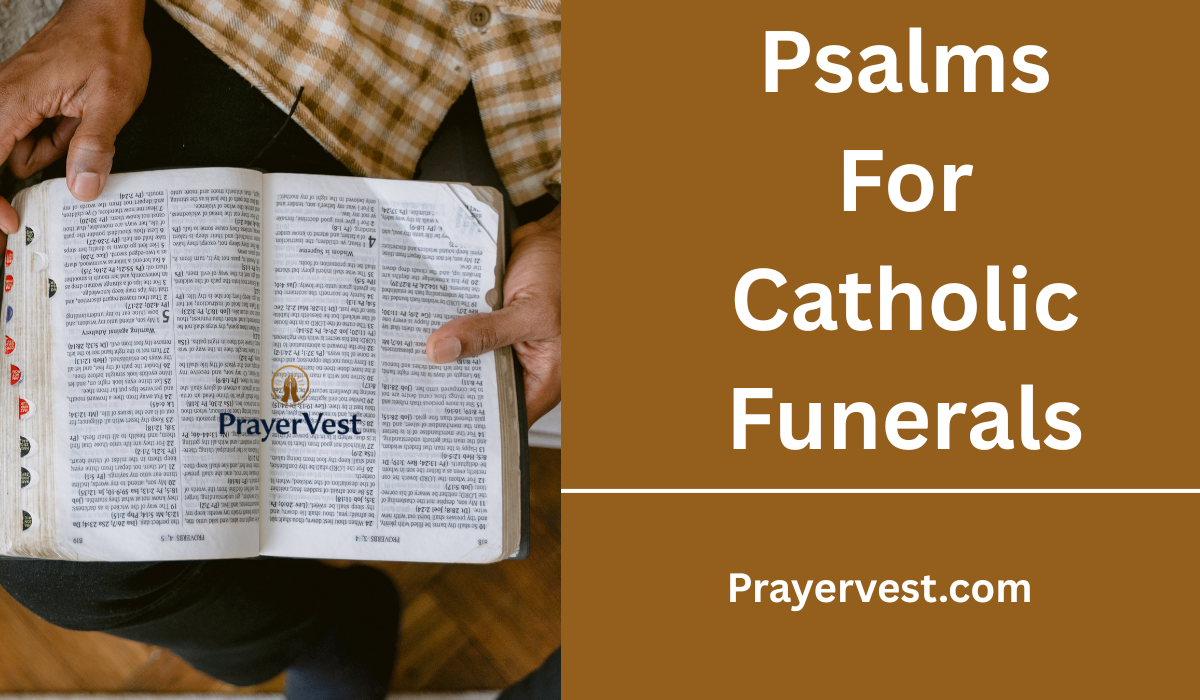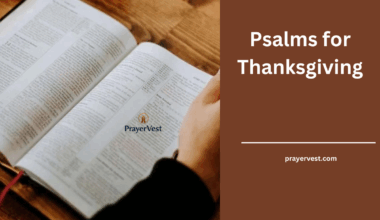With their words of consolation, faith, and hope in the face of loss and sadness, the Book of Psalms has long occupied a hallowed position in Catholic funeral liturgy. These lyrical prayers, which have their roots in ancient Jewish worship and have been accepted by the Church for centuries, give expression to the most profound human emotions, including praise, longing, grief, and trust.
The Psalms for catholic funerals softly bring the bereaved into God’s presence, reminding us of His unending compassion and mercy during times when words cannot express how we feel and our hearts are heavy.
Psalms are deeply included in the liturgy during Catholic funerals. They provide a spiritual space for both mourning and comfort, whether they are chanted as responsorial psalms during Mass or reflected upon in private prayer.
The universal cry of the soul seeking light amid darkness is echoed in psalms such as “The Lord is my shepherd” (Psalm 23) and “Out of the depths I cry to you, O Lord” (Psalm 130). Instead of avoiding grief, these holy writings transform it via faith and focus our attention on the promise of resurrection.


The Psalms ultimately act as a link between the ground and heaven, between the frailty of humanity and the power of God. They serve as a reminder that God sees our tears and that people who die in Christ are at peace with Him. The Psalms encourage us to grieve with reverence, mourn with hope, and put our faith in the God who promises eternal life as we come together to celebrate the life of a loved one. The Psalms continue to be an essential and comforting component of every Catholic funeral because of their enduring beauty and profound spiritual meaning.
50 Most ComfortingPsalms For Catholic Funerals (2026)
1. Psalm 23:4
“Even though I walk through the valley of the shadow of death, I will fear no evil, for you are with me; your rod and your staff, they comfort me.”
This beloved verse from Psalm 23 offers one of the most comforting affirmations of God’s abiding presence in moments of deepest sorrow. As the soul journeys through the dark valley of loss, God’s nearness becomes the source of courage and strength. The rod and staff—symbols of divine protection and guidance—serve as reassurance that even death is not a void but a passage accompanied by the Shepherd Himself. This verse anchors the grieving in a profound truth: God does not abandon us in death, but walks with us through it.
Reflection
In the presence of grief, this Psalm reminds us that death is not the end, but a threshold where God still reigns with love and sovereignty. The shadow of death may loom, but it cannot overcome the light of God’s promise. For Catholic funerals, this passage beautifully affirms the faith that our loved ones are not lost, but received by a loving Shepherd who leads them into eternal peace. It invites the bereaved to rest in the assurance that even in silence and separation, divine comfort surrounds and upholds them.
2. Psalm 116:15
“Precious in the sight of the Lord is the death of his faithful servants.”
This verse provides a powerful theological insight into how God views the death of His children. Far from being a mere end, the passing of the faithful is regarded as precious—an event held in reverence by the Creator. It echoes the Catholic teaching on the dignity of human life and the sacredness of the journey from earthly exile to eternal communion with God. This passage offers deep comfort: our sorrow is known to God, and the death of our loved ones is not trivial to Him, but treasured.
Reflection
For Catholic funerals, Psalm 116:15 helps shift the lens from loss to divine purpose. Grief is not ignored—it is embraced with the knowledge that heaven rejoices even as we mourn. This verse affirms that our tears are not in vain, and our love does not go unnoticed. It encourages us to celebrate the life of the departed with reverence, hope, and the peace of knowing they are seen and cherished by God Himself.
3. Psalm 34:18
“The Lord is close to the brokenhearted and saves those who are crushed in spirit.”
This verse speaks directly into the rawness of grief. It affirms that God is not distant or indifferent to our sorrow—He draws near to those who are broken. In Catholic theology, God’s closeness is not merely emotional but sacramental and redemptive. He enters into our suffering with healing grace. This Psalm assures mourners that their pain is not unnoticed or purposeless but is accompanied by the comforting nearness of God.
Reflection
In a time of mourning, Psalm 34:18 offers profound hope. It reminds us that while death separates us from those we love, it does not separate us from the love of God. The funeral becomes not just a farewell, but a sacred space where the brokenhearted are embraced by divine compassion. This verse invites those grieving to open their wounded hearts to the One who promises not only to console but to restore.
4. Psalm 42:11
“Why, my soul, are you downcast? Why so disturbed within me? Put your hope in God, for I will yet praise him, my Savior and my God.”
This verse captures the inner turmoil of grief and the struggle to find hope in pain. The psalmist speaks to his own soul, urging it toward trust even when all seems lost. For Catholic funerals, this verse serves as a reminder that lament and faith can coexist. Mourning is holy, but even in the depth of sorrow, we are called to lift our eyes to the God who saves and renews.
Reflection
Grief often brings inner unrest—a soul weighed down by sorrow and unanswered questions. Psalm 42:11 reminds us that hope is not a feeling, but a decision to trust God even through tears. At a funeral, this verse becomes a whisper of faith amid the silence of loss. It encourages the bereaved to believe that the story is not over, that resurrection follows death, and that praise will one day rise again from mourning hearts.
5. Psalm 27:1
“The Lord is my light and my salvation—whom shall I fear? The Lord is the stronghold of my life—of whom shall I be afraid?”
Psalm 27:1 proclaims unwavering trust in God even in the face of death. This verse serves as a bold declaration of faith, perfect for the Catholic funeral liturgy which centers on the promise of eternal life through Christ. It reminds us that fear, including the fear of death, is eclipsed by God’s enduring light and protection. The soul anchored in God does not tremble at death, but rests securely in Him.
Reflection
In a moment where life feels uncertain and loss is heavy, this verse offers a powerful statement of courage. It invites the grieving to look beyond the grave toward the eternal light of salvation. At a Catholic funeral, this Psalm proclaims that death does not have the final word—God does. And His word is salvation, strength, and everlasting peace. This passage encourages mourners to shift from fear to faith, grounded in the hope of the Resurrection.
6. Psalm 30:5
“Weeping may stay for the night, but rejoicing comes in the morning.”
This verse from Psalm 30 offers hope beyond the sorrow of the present moment. It acknowledges the deep and real pain of loss, but also points to the dawn of joy that follows. For the Catholic faithful, this joy is not just emotional—it is eternal, rooted in the resurrection of Christ and the promise of life everlasting.
Reflection
At a funeral, Psalm 30:5 helps us frame grief as a passing night overshadowed by the promise of morning. Though tears may flow today, there is a divine assurance that rejoicing awaits—both for the departed in eternal glory and for the living in time. The Psalm gently leads mourners to trust that God’s plan includes joy beyond what they now understand.
7. Psalm 46:1
“God is our refuge and strength, an ever-present help in trouble.”
This powerful declaration offers strength to those in sorrow. God is portrayed not as a distant figure, but as an immediate source of comfort and stability. In Catholic funerals, where emotions run deep, this verse affirms God’s active presence as a shelter in our time of mourning.
Reflection
Psalm 46:1 reminds the grieving that they are not left to carry sorrow alone. God stands as a fortress around the heart, offering strength to endure the pain of loss. This verse gives voice to those who feel fragile, assuring them that divine support never wavers, even when human words and comforts fall short.
8. Psalm 90:12
“Teach us to number our days, that we may gain a heart of wisdom.”
This verse invites reflection on the brevity of life and the eternal perspective we must carry. In the context of a Catholic funeral, it calls the living to consider the legacy of the deceased and the sacredness of every moment. Life is fragile, but within that fragility lies deep wisdom and purpose.
Reflection
Death often awakens a new awareness of life’s preciousness. Psalm 90:12 gently urges us to live with intention, humility, and readiness. At a funeral, it becomes a prayer that grief might teach us not only to mourn, but to live more wisely—with love, faith, and eternity in mind.
9. Psalm 73:26
“My flesh and my heart may fail, but God is the strength of my heart and my portion forever.”
This verse captures the reality of human frailty and the eternal strength found in God. At the time of death, when the body fails, faith holds firm. For Catholic funerals, it proclaims that the soul, sustained by grace, continues in the presence of God beyond earthly limitations.
Reflection
Grief reminds us that our human strength has limits. Yet, Psalm 73:26 directs our hearts to the Source who never fails. As we bid farewell to those we love, this verse assures us that God Himself is our eternal inheritance. It lifts the eyes of the mourner from the grave to the promise of divine presence and everlasting strength.
10. Psalm 31:5
“Into your hands I commit my spirit; deliver me, Lord, my faithful God.”
These words, echoed by Jesus on the cross, represent the ultimate surrender of the soul into God’s hands. At a Catholic funeral, this verse serves as both a farewell and a declaration of faith. It entrusts the deceased into God’s mercy and affirms their eternal security in Him.
Reflection
Psalm 31:5 speaks peace over death. It reminds us that even the final breath can be a sacred act of trust. For the living, it is a call to entrust their own souls to God daily. And for the departed, it is a prayer that their spirit is now safely held in the hands of the Faithful One.
11. Psalm 4:8
“In peace I will lie down and sleep, for you alone, Lord, make me dwell in safety.”
This verse carries a quiet peace, echoing the eternal rest of the soul. It portrays sleep not as an end, but as a sacred rest in God’s protection. In the Catholic tradition, this verse connects to the hope of eternal rest granted to the faithful departed.
Reflection
At a Catholic funeral, Psalm 4:8 becomes a gentle benediction. It frames death as a peaceful sleep in the arms of God, free from fear and full of trust. For the living, it is a prayer of release—for both their sorrow and for the soul of their beloved, now safely cradled in divine peace.
12. Psalm 116:7
“Return to your rest, my soul, for the Lord has been good to you.”
This verse offers reassurance to the soul that has been weary from sorrow. At a time of loss, it invites both the deceased and the grieving to find rest in the goodness of God. It acknowledges the soul’s journey and welcomes its return to peace.
Reflection
In a funeral setting, Psalm 116:7 encourages us to let go with hope. It affirms that the journey ends not in despair, but in the goodness of God. The soul may return to its Maker, and the living may find peace in that sacred release. This verse blesses the moment of transition with calm and comfort.
13. Psalm 121:1-2
“I lift up my eyes to the mountains—where does my help come from? My help comes from the Lord, the Maker of heaven and earth.”
These verses affirm that even in grief, our help is not lost. It calls the mourner to lift their eyes—to rise above despair and remember the Creator who sustains all life. For Catholic funerals, it emphasizes God’s sovereignty and the hope that surpasses death.
Reflection
Psalm 121:1-2 is a declaration of trust when strength is gone. It reminds the grieving that their help is not in people or places, but in the Lord of life. At the grave, this Psalm lifts eyes from sorrow to the One who created and now receives the soul of the departed.
14. Psalm 84:10
“Better is one day in your courts than a thousand elsewhere.”
This verse proclaims the surpassing joy of being in God’s presence. For Catholic funerals, it reflects the heart’s longing for heaven—the eternal dwelling place with God. It assures the living that their loved one now abides where joy never fades.
Reflection
Psalm 84:10 gives hope by pointing to what truly matters: eternity with God. While the loss on earth feels overwhelming, this verse affirms that one moment in God’s glory far outweighs a lifetime of earthly sorrow. It helps us imagine the joy our loved ones now experience and encourages us to live for that same destination.
15. Psalm 103:15-17
“The life of mortals is like grass… But from everlasting to everlasting the Lord’s love is with those who fear him.”
This passage reflects on the fleeting nature of human life but contrasts it with the eternal constancy of God’s love. It brings a profound awareness of mortality while pointing to divine permanence and mercy.
Reflection
At a Catholic funeral, Psalm 103 places human life within the larger frame of eternity. It allows mourners to acknowledge fragility while also rejoicing in the enduring love that accompanies the soul beyond death. It reminds us that though life fades like grass, the soul is held forever in God’s steadfast love.
16. Psalm 6:2-4
“Have mercy on me, Lord, for I am faint… Turn, Lord, and deliver me; save me because of your unfailing love.”
This cry for mercy reflects the soul’s final longing for divine rescue. It fits beautifully in the Catholic funeral tradition, where we pray for the repose of souls, trusting in God’s unfailing mercy and compassion.
Reflection
Psalm 6 reminds us that even at life’s end, it is not too late to call on the mercy of God. As we commend souls to the Lord, this verse becomes a powerful intercession, trusting that God’s love is greater than sin, sickness, or even death. It assures the mourners that God’s mercy is the soul’s final hope and eternal salvation.
17. Psalm 139:8
“If I go up to the heavens, you are there; if I make my bed in the depths, you are there.”
This verse proclaims God’s omnipresence, even beyond death. There is no place the soul can go where God is not already present. For Catholic funerals, it assures the living that their loved one has not gone somewhere God cannot reach—they are still within His embrace.
Reflection
Psalm 139:8 comforts us with the truth that God’s presence transcends life and death. It affirms that the grave is not a godless place but a place still saturated with divine love. This verse gently assures mourners that their loved ones have entered into the eternal presence of the One who has always been with them.
18. Psalm 145:18
“The Lord is near to all who call on him, to all who call on him in truth.”
This verse reassures those in grief that God draws near in response to sincere prayer. In the context of a Catholic funeral, it encourages heartfelt supplication for the soul of the deceased and reminds the mourners that their cries are not in vain.
Reflection
Psalm 145:18 brings solace to families who are praying, weeping, and remembering. It affirms that God listens closely, lovingly, and attentively. This verse offers peace: our prayers for the departed and our cries for comfort do not fall into silence—they are heard by the God who is near.
19. Psalm 55:22
“Cast your cares on the Lord and he will sustain you; he will never let the righteous be shaken.”
This verse invites the mourners to hand over their grief to God, trusting Him to sustain them through the pain. For Catholic funerals, it serves as a reminder that we are not meant to carry sorrow alone—God offers to bear it with us.
Reflection
Psalm 55:22 is a balm for the burdened heart. It invites mourners to let go of what they cannot fix and rest in the One who can. It is a call to surrender grief, knowing that God’s sustaining hand never wavers, even when our strength does.
20. Psalm 27:13-14
“I remain confident of this: I will see the goodness of the Lord in the land of the living… Wait for the Lord; be strong and take heart.”
This verse is filled with hope for the future, affirming that even in sorrow, God’s goodness is still at work. For Catholic funerals, it offers courage to those who remain and a vision of reunion in the life to come.
Reflection
Psalm 27 closes with a call to hope. In the face of death, it lifts the mourner’s heart toward future restoration and eternal life. It encourages the bereaved to wait in faith—not only for healing in this life but for the joy of reunion in the next. God’s goodness will yet be seen.
21. Psalm 91:1-2
“Whoever dwells in the shelter of the Most High will rest in the shadow of the Almighty. I will say of the Lord, ‘He is my refuge and my fortress, my God, in whom I trust.’”
This comforting passage portrays God as a divine refuge for the soul. For Catholic funerals, it beautifully depicts the eternal rest of the departed under God’s protective shadow. It speaks of trust, peace, and the assurance of safety in God’s presence.
Reflection
Psalm 91 reassures us that death is not abandonment but entry into divine shelter. The soul rests, not in fear, but under the wings of the Almighty. It offers profound peace to the grieving, affirming that God holds the departed securely and will also be the strength of those left behind.
22. Psalm 62:1
“Truly my soul finds rest in God; my salvation comes from him.”
This verse captures the essence of eternal rest—peace found in God’s salvation. For Catholic funerals, it is both a declaration and a hope: the soul of the departed now finds true rest in the One who saves.
Reflection
In a time when our souls feel restless with loss, this Psalm reminds us that true rest lies in God alone. It helps mourners place their grief in God’s hands, trusting that the one who has passed is now embraced in divine peace and everlasting salvation.
23. Psalm 63:1
“You, God, are my God, earnestly I seek you; I thirst for you, my whole being longs for you.”
This Psalm expresses the soul’s deep yearning for God, a longing that is fully satisfied only in eternal union with Him. For Catholic funerals, it speaks of a life lived in pursuit of God and fulfilled in His presence.
Reflection
The longing described in Psalm 63 is fulfilled in death when the faithful enter into God’s fullness. For the mourners, it is a call to keep seeking God in their sorrow. The soul that longed for God now rests in His embrace, and that hope remains for all who follow Christ.
24. Psalm 85:10
“Love and faithfulness meet together; righteousness and peace kiss each other.”
This poetic verse presents a beautiful picture of heaven—where all divine attributes are perfectly united. For Catholic funerals, it offers a vision of what the faithful now experience: perfect peace, love, and righteousness in God’s kingdom.
Reflection
Psalm 85:10 allows mourners to envision the eternal harmony that awaits the faithful departed. It comforts the living by reminding them that their loved one now experiences what we all long for—a world where peace and love reign forever under God’s rule.
25. Psalm 25:6-7
“Remember, Lord, your great mercy and love, for they are from of old. Do not remember the sins of my youth… according to your love remember me.”
This humble plea for mercy is a fitting prayer at the end of life. In Catholic funerals, it reflects the Church’s tradition of intercession and trust in God’s compassionate judgment.
Reflection
Psalm 25 leads us into the heart of divine mercy. It reflects the Catholic prayer for the faithful departed—that God will look not at their sins but at His enduring love. As we commend them to the Lord, we do so in the confidence that His mercy triumphs over judgment.
26. Psalm 37:23-24
“The Lord makes firm the steps of the one who delights in him… though he may stumble, he will not fall, for the Lord upholds him with his hand.”
These verses celebrate the faithfulness of God throughout life, even when one falters. In the context of a Catholic funeral, they honor a life lived with God and conclude with assurance of God’s sustaining grace into eternity.
Reflection
Psalm 37 comforts mourners by reflecting on the journey of the faithful. Even through trials, the Lord upheld them. Now, in death, they have not fallen—they have been carried home. It inspires the living to trust in the same sustaining hand as they continue their walk.
27. Psalm 130:5-6
“I wait for the Lord, my whole being waits, and in his word I put my hope.”
This expression of hope in God’s promise is central to the Catholic understanding of eternal life. It affirms the virtue of patient, trusting faith—both for the departed and for those who mourn.
Reflection
Psalm 130 encourages us to wait in hope—even through the darkness of grief. Just as the soul of the faithful departed waited for the Lord, we too wait with trust, knowing that God’s promise of resurrection and reunion is sure. Mourning is not hopeless; it is laced with holy expectation.
28. Psalm 56:8
“Record my misery; list my tears on your scroll—are they not in your record?”
This tender verse shows that every tear is seen and remembered by God. In Catholic funerals, it acknowledges the deep personal sorrow of the bereaved and offers assurance that God values every emotion.
Reflection
Psalm 56:8 tells us that our mourning is sacred. God does not overlook our pain—He records it. He draws close to every grieving heart, not just as a comforter, but as a compassionate witness. Our sorrow matters, and in His time, He will turn our mourning into joy.
29. Psalm 147:3
“He heals the brokenhearted and binds up their wounds.”
This verse offers gentle healing for those left behind. In Catholic funerals, where grief is fresh, it reassures mourners that God’s healing is already at work—even in their shattered hearts.
Reflection
Grief leaves wounds that feel unbearable. But Psalm 147:3 affirms that the Divine Healer is present. As we mourn the loss of a loved one, God is tending to our hearts, binding us with peace. Healing may not be immediate, but it is sure, and it is sacred.
30. Psalm 16:11
“You make known to me the path of life; you will fill me with joy in your presence, with eternal pleasures at your right hand.”
This verse declares the ultimate fulfillment found in God’s presence. It reflects the Catholic belief in the beatific vision—the joy of seeing God face to face after death.
Reflection
Psalm 16:11 offers joy in the midst of sorrow. It helps us imagine what the departed now experience: eternal pleasure and fullness of joy in God’s presence. While we grieve their absence, we rejoice in their reward—a joy that one day we too will share.
31. Psalm 71:9
“Do not cast me away when I am old; do not forsake me when my strength is gone.”
This heartfelt plea for God’s continued presence in aging and weakness resonates deeply in a funeral setting. It affirms the dignity and sacredness of life even in its final stages.
Reflection
Psalm 71 reflects a soul that clings to God even as the body weakens. In Catholic funerals, it affirms that God remains faithful even to the final breath. The aged are not abandoned—they are received, remembered, and honored in the heart of God.
32. Psalm 49:15
“But God will redeem me from the realm of the dead; he will surely take me to himself.”
This verse offers a bold declaration of trust in God’s power over death. It resonates with the Catholic hope in the resurrection and the communion of saints.
Reflection
Psalm 49 gives voice to triumphant faith. In the face of death, it proclaims that God redeems and receives the faithful soul. It affirms the sacred truth: death is not defeat—it is a divine transition into God’s eternal embrace.
33. Psalm 55:6
“Oh, that I had the wings of a dove! I would fly away and be at rest.”
This poetic longing for escape and peace reflects the deep desire for eternal rest. At Catholic funerals, it serves as an image of the soul’s journey into heavenly peace.
Reflection
In Psalm 55:6, we hear the sigh of a soul weary from life’s burdens. Now, that soul has taken flight—into rest, into peace, into God. For the mourners, it is a reminder that the restless soul has found its home.
34. Psalm 40:1-2
“I waited patiently for the Lord; he turned to me and heard my cry… he set my feet on a rock and gave me a firm place to stand.”
These verses depict God’s attentive response to a soul in distress. In Catholic funerals, they symbolize both the patient faith of the departed and the hope for those who remain.
Reflection
Psalm 40 affirms that God hears. The one who cried out in life has now been lifted up and set upon the rock of eternal life. For the grieving, it is a promise that God still hears—and He will lift them too, in time, from their sorrow.
35. Psalm 103:1-2
“Praise the Lord, my soul; all my inmost being, praise his holy name. Praise the Lord, my soul, and forget not all his benefits.”
This Psalm of thanksgiving is a beautiful way to honor a life of faith. In the Catholic funeral context, it is a joyful reminder of God’s blessings both in life and beyond the grave.
Reflection
Psalm 103 becomes a hymn of praise even in mourning. It invites the community to celebrate God’s goodness in the life of the departed and in the promise of eternal life. Amid sorrow, praise rises—because God’s blessings never end.
36. Psalm 34:4-5
“I sought the Lord, and he answered me; he delivered me from all my fears. Those who look to him are radiant; their faces are never covered with shame.”
These verses express trust in the Lord’s deliverance and faithfulness. For Catholic funerals, they speak of a life that sought God and was delivered from fear—now radiant in His eternal light.
Reflection
Psalm 34 assures us that the faithful are never forgotten. The soul that turned to God in life is now radiant in His glory. This verse offers peace to the bereaved, reminding them that faith does not end in fear—it ends in deliverance and eternal dignity in the presence of God.
37. Psalm 18:28
“You, Lord, keep my lamp burning; my God turns my darkness into light.”
This verse testifies to God’s ability to transform despair into hope and darkness into light. At a Catholic funeral, it reminds us that even in the deepest sorrow, the Lord shines through.
Reflection
Psalm 18:28 gives hope to the grieving that God will not let their inner flame go out. The darkness of death is not the end—it is the place where God’s light becomes most visible. For the faithful departed, their darkness has become eternal light in His presence.
38. Psalm 19:14
“May these words of my mouth and this meditation of my heart be pleasing in your sight, Lord, my Rock and my Redeemer.”
This verse is a humble prayer that one’s life and words may be found pleasing to God. In Catholic funerals, it reflects the desire for a holy death and a life lived in right relationship with the Creator.
Reflection
Psalm 19:14 echoes the Catholic heart of offering one’s life as a sacrifice pleasing to God. At the end of life, we entrust the soul of our loved one to God, praying that their life was a sweet fragrance of worship. It’s a reminder that each moment matters and that a faithful life leaves a lasting legacy.
39. Psalm 37:39-40
“The salvation of the righteous comes from the Lord; he is their stronghold in time of trouble… the Lord helps them and delivers them.”
These verses proclaim God as the Savior and Deliverer of the righteous. In a Catholic funeral, they affirm that the soul now rests in the saving hands of the Lord.
Reflection
Psalm 37 strengthens the faith of the mourners with the assurance of divine rescue. The faithful departed are not lost—they have been delivered. It invites us to rejoice in their salvation, and to lean on the same stronghold for our own strength as we mourn.
40. Psalm 48:14
“For this God is our God for ever and ever; he will be our guide even to the end.”
This verse proclaims the enduring faithfulness of God, even in death. At Catholic funerals, it affirms that the Lord guides His people not only through life but into eternity.
Reflection
Psalm 48:14 gives comfort in knowing that God never ceases to be our Shepherd—not in life, nor in death. He walks with the soul into eternity. For the grieving, it offers hope that their journey continues under the same faithful guidance and that they, too, will one day be guided home.
41. Psalm 61:1-2
“Hear my cry, O God… lead me to the rock that is higher than I.”
This cry for divine refuge is a fitting prayer in the time of loss. In Catholic funerals, it is a heartfelt call for stability, comfort, and strength that transcends human limits.
Reflection
Psalm 61 becomes a personal plea for every mourner. When we are overwhelmed by grief, God lifts us higher—onto the rock of His presence. It invites us to run to Him and find elevation above our sorrow, secure in the knowledge that He will never let us fall.
42. Psalm 144:3-4
“Lord, what are human beings that you care for them… They are like a breath; their days are like a fleeting shadow.”
This sobering verse reflects on the brevity of human life and the mystery of God’s attention toward us. It is a fitting meditation for a funeral, where life’s fragility is deeply felt.
Reflection
Psalm 144 humbles and consoles. Though our days are short, God values them immensely. In Catholic funerals, this Psalm reminds us of both our smallness and God’s infinite care. It honors the life of the deceased while drawing attention to the One who holds eternity in His hands.
43. Psalm 41:3
“The Lord sustains them on their sickbed and restores them from their bed of illness.”
This verse points to God’s healing presence even in sickness and death. In Catholic funerals, especially those following a long illness, it brings assurance that God has already begun the restoration in eternity.
Reflection
Psalm 41 assures us that God is present in suffering and faithful beyond it. For the one who has died, restoration is now complete—not in the body, but in the soul. For the living, this is a source of consolation that every suffering ends in God’s healing hands.
44. Psalm 146:5
“Blessed are those whose help is the God of Jacob, whose hope is in the Lord their God.”
This verse highlights the blessedness of trusting in God. For Catholic funerals, it affirms that those who died in the Lord have died in hope—and that is a beautiful and holy thing.
Reflection
Psalm 146 calls the mourners to reflect on the life of faith. The one who hoped in God is now eternally blessed. And their example calls us to the same hope—to place our help and our hearts in the God who never fails.
45. Psalm 133:1
“How good and pleasant it is when God’s people live together in unity!”
This verse celebrates spiritual community and harmony. It is particularly fitting in funerals that bring families and faith communities together in shared grief and prayer.
Reflection
Psalm 133 reminds us that unity honors the departed. As we come together to grieve, we also reflect the beauty of Christian communion. The soul now joins the greater communion of saints, where unity is perfected and eternal.
46. Psalm 30:11
“You turned my wailing into dancing; you removed my sackcloth and clothed me with joy.”
This verse captures the transformation of mourning into rejoicing, a foreshadowing of the resurrection. In Catholic funerals, it proclaims that the grave is not the final chapter.
Reflection
Psalm 30 is a promise that grief will one day be replaced with joy. It assures the mourners that God will one day turn their tears into dancing—and that their loved one already wears the garments of eternal joy.
47. Psalm 138:7
“Though I walk in the midst of trouble, you preserve my life… with your right hand you save me.”
This Psalm affirms God’s active preservation in life and through death. For Catholic funerals, it reflects the soul’s confidence in divine rescue—even in its final hour.
Reflection
Psalm 138 affirms that God never abandons. Even in the shadow of death, His hand saves. For those left behind, it is a promise that God is still preserving them and will one day reunite them with their loved ones.
48. Psalm 24:1
“The earth is the Lord’s, and everything in it, the world, and all who live in it.”
This verse recognizes God’s ownership over life and death. In Catholic funerals, it reminds us that we belong to God, in life, in death, and forevermore.
Reflection
Psalm 24 teaches that everything, including the soul of our loved one, belongs to the Lord. This truth brings comfort—it is not ours to hold on to, but God’s to receive. We release them into His hands, trusting in His eternal care.
49. Psalm 84:2
“My soul yearns, even faints, for the courts of the Lord; my heart and my flesh cry out for the living God.”
This verse expresses deep spiritual longing for God’s presence. In a funeral context, it honors a soul that longed for heaven and has now entered into it.
Reflection
Psalm 84 gives voice to the holy yearning within every believer. It assures us that the one we mourn is now satisfied in the presence they always longed for. It invites us to share in that longing until we, too, are called home.
50. Psalm 121:7-8
“The Lord will keep you from all harm—he will watch over your life; the Lord will watch over your coming and going both now and forevermore.”
These verses offer a beautiful benediction of divine watchfulness. For Catholic funerals, they seal the service with hope: God is still watching, guiding, and protecting.
Reflection
Psalm 121 assures the mourners that the Lord’s care doesn’t stop at the grave. He watched over their loved one in life, and now watches over them in eternity. It is also a promise that He continues to watch over those who remain, guiding them until their own coming and going is complete.
Conclusion
When we are grieving, the Psalms offer a sacred language that lifts our gaze to heaven and speaks to the core of our sadness. Their timeless words, which provide consolation and bravery in the face of death, bind us to a rich religious heritage. These Scriptures serve as a reminder that God is close to the brokenhearted and that our loved ones are now at rest in His eternal peace, whether they are chanted during the funeral Mass or prayed in private.
Turning to the Psalms enables us to process our suffering through prayer and praise as we commemorate the lives of those who have come before us. They remind us that death is merely a transition into eternal life rather than the end, and they gently lead us from grief to hope. We enhance our own faith in the resurrection and the afterlife by putting our loved ones in God’s care through these potent verses.






